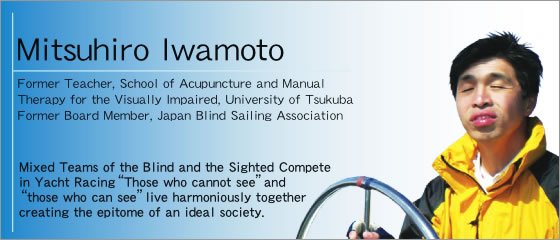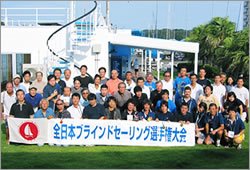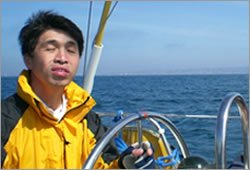YuYu Interview Mitsuhiro Iwamoto
 |
|
In his early childhood, his eyesight was deteriorating. To receive his elementary education, he had to attend a school for the blind. He was almost overwhelmed by the harshness of his destiny. When he was sixteen, he put himself face-to-face with his worry, anger, and fear for the things he was losing, and said to himself, “Should I live in hope, with a forward-looking attitude, or live in despair, cursing my adversity? Either way, I have to live my life.”After weeping all through the night, he finally moved on to a new chapter of his life, feeling as if there had been a ray of light coming down from Heaven. While pursuing a career as a teacher of acupuncture and physical therapy, he married a very nice woman and discovered the world of yacht sailing. Having formed a team to participate in the 2009 IFDS World Blind Sailing Championship, taking place in New Zealand next March, he’s training and preparing for the competition while looking for sponsors to support him in pursuit of his dream. 
2004 All Japan Blind Sailing Championship
—— How did you meet your wife? When I was a student at Acupuncture and Physical Therapy Teacher Training School of the University of Tsukuba, I took two years off from school to study at San Francisco State University on a scholarship. After two years, I went back to Japan and started going to an English conversation school. I met my wife there. She was born in the U.S. and her father was an Air Force physician. She lived in Japan for three years when she was little. She now speaks conversational Japanese with no problems. Two years after we met, she came back to the States and we continued our long-distance relationship while she was in the U.S. and I was in Japan. We married in 1996, but our parents on both sides were against it. It was very difficult. I heard that her parents, especially her mother, strongly opposed our marriage because of my peculiarity and negative aspect -- that is, being Japanese and blind. So did my parents. I had told them I would open a clinic in Kumamoto, my hometown, and they were comfortable with that idea. Then I surprised them by saying I would go to Tokyo to become a teacher. Then I astonished them by telling them my intention to study in San Francisco, and now what? Marriage to an American woman? I didn’t have to cut myself off from my parents, because they finally gave in and we were married.
—— How did your visual impairment progress? 
Preparing for the 2009 IFDS World Blind Sailing Championship
My late father used to apologize to me, and my mother still does, saying “We are sorry that I gave birth to you as a blind person. We don’t even have anything to leave to you....” But I was able to go to Tokyo and come to the U.S., all because of my blindness. I had the opportunity to discover sailing for the same reason. —— Can you tell us about the turning point of your life? On a hot summer day, I changed my negative thinking into positive thinking. I was sixteen. That very moment was the turning point of my life.“Should I live in despair, always worrying about my problems, or live in hope, with a forward-looking attitude?” Which to choose? I asked myself over and over. Can I suppress my resentment for being unable to do the things that I used to do with no problems? Can I overcome my strong unwillingness to use a cane? I once thought about throwing myself into the Amakusa sea. Worried, upset, and fearful for the things I was losing, I cried through the night. But, when my tears dried up, I was able to get myself under control. It was as if a ray of light had come down from Heaven. Then I started thinking that if I could transform suffering into positive action, it would become a force for life. —— Can you share an unforgettable experience with us? 
“If you transform suffering into positive action, it becomes a force for life”
—— Do you have a message for people today? I studied the basic theories of psychology while working as a teacher. In the meantime, I learned that many people have a lot of worries. I once thought about killing myself just like many others, but I can say this now. If you change your negative thinking into positive thinking, you can meet nice people and receive support from many people. A wonderful life is waiting for you. I think there are some people in the U.S. who are not satisfied with their current situations. They may say, “I left Japan with my heart full of hope, but my life here is different from what I imagined,” or “I’m disappointed with what I’m doing here.” But I want to tell these people that they can change the direction their lives are going in. It all depends on how they look at, deal with, and understand things in life. You as a sighted sailor can make it possible for me to operate the yacht by taking the role of sighted skipper and telling me about the surrounding conditions. You can take such an important role, but why do you want to kill yourself? -- I want to continue sending people this message. In the U.S., there is a blind mountain climber who has successfully reached the summit of Mount Everest. It was the result of climbing with sighted climbers. I believe “those who cannot see” and “those who can see” can really work together through yacht sailing too. I believe it’s possible if people who share this belief contact us through the mass media. —— What is your dream for the future? 
With Osaka Kitchen owner & chef, Takashi Kitamura (at right), another sailor and supporter
Another big dream of mine is to form an organization that helps out people who have lost meaning in their life or are suffering through depression because of their problems. I want to give such people hope by providing them the opportunity to come to San Diego from Japan to experience sailing. My wife is a big part of my life. She understands my selfish desire to continue sailing. We have a young daughter and my wife is busy taking care of her. So my wife can’t spare time to sail, but she doesn’t mind driving me to the harbor when I have practice. I’m very grateful to her. On the weekends, we’ll have a relaxing family time on a yacht in San Diego.... That’s another dream for the future. For me, San Diego is my third hometown, following Kumamoto and Tokyo. (05-16-2008 issue) |


